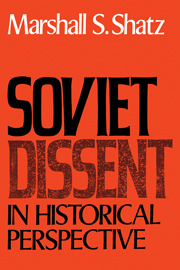Book contents
- Frontmatter
- Contents
- Preface
- 1 Introduction
- 2 The genesis of the Russian intelligentsia
- 3 The formation of a Russian intelligent
- 4 Reason and revolution
- 5 Khrushchev and the de-Stalinization campaign: the development of literary dissent
- 6 The Siniavsky–Daniel trial and its aftermath: legal tactics and organizational efforts
- 7 The Soviet dissidents
- 8 Programs and prospects
- Notes
- Select bibliography
- Index
8 - Programs and prospects
Published online by Cambridge University Press: 04 August 2010
- Frontmatter
- Contents
- Preface
- 1 Introduction
- 2 The genesis of the Russian intelligentsia
- 3 The formation of a Russian intelligent
- 4 Reason and revolution
- 5 Khrushchev and the de-Stalinization campaign: the development of literary dissent
- 6 The Siniavsky–Daniel trial and its aftermath: legal tactics and organizational efforts
- 7 The Soviet dissidents
- 8 Programs and prospects
- Notes
- Select bibliography
- Index
Summary
A world has collapsed … a new one will be born.
Boris Pasternak, 1956.I shall not live to see the future, but I am haunted by the fear that it may be only a slightly modified version of the past.
Nadezhda Mandelstam.In the nineteenth century, frustrated by the imperial government's unwillingness or inability to implement timely reform, Russian dissidents ultimately turned to revolution. In view of the steady repression of dissent by the Soviet authorities since 1966, is such a development likely to recur? Unless circumstances change drastically, today's dissidents seem certain to remain committed, as, with few exceptions, they have been hitherto, to peaceful improvement. Unlike the nineteenth-century intelligentsia, the Soviet dissidents have not produced an inner core of activists consistently advocating violent overthrow of the existing regime, although a few individuals or groups may have expressed themselves in favor of such a course to one degree or another. Even if it were a practical possibility under Soviet conditions, a revolutionary upheaval could appeal only to the most incorrigible romantics. Russian history contains persuasive arguments against revolution as the road to civil liberties and the rule of law. The Revolution of 1917 and the three-year civil war that followed it unleashed deep-rooted social tensions and bitter ideological fanaticism, which not only caused unimaginable destruction and loss of life but helped to generate the methods of rule that Stalin was later to perfect.
- Type
- Chapter
- Information
- Soviet Dissent in Historical Perspective , pp. 157 - 183Publisher: Cambridge University PressPrint publication year: 1981



